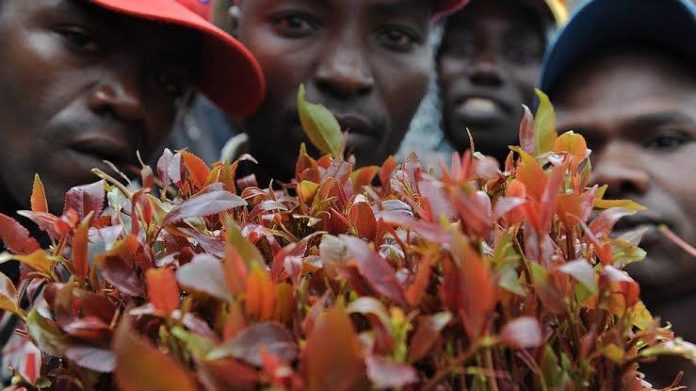Facebook Twitter (X) Instagram Somali Magazine - People's Magazine
Kenyan khat farmers have halted exports to Somalia, intensifying a pricing dispute that has left Mogadishu’s khat markets at a standstill for nearly a week. Frustrated by what they call unfair pricing, the farmers are demanding an increase of 300 Kenyan shillings (Ksh) per kilogram and a minimum payment of Ksh 200,000 per bag for the premium “Grid” variety of khat. The standoff threatens to disrupt the vital supply chain of the stimulant, which is widely consumed across Somalia.
Despite khat fetching up to Ksh 5,700 per kilogram in Mogadishu, Kenyan farmers argue they receive only Ksh 300, a disparity that they say benefits middlemen and transporters while leaving them with unsustainable profits. Karuiru, chairman of the Kenyan Khat Farmers Association, voiced his frustration, stating that the costs associated with transporting khat to Mogadishu exceed Ksh 3,000 per kilogram. He emphasized that while other players in the supply chain reap significant profits, farmers struggle with razor-thin margins. According to him, an additional Ksh 1,000 per kilogram would secure a fairer deal for farmers who are currently bearing the brunt of the economic imbalance.
In Somalia, the impact of the boycott is already being felt, as traders accuse the government of implementing policies that favor select importers while local sellers grapple with skyrocketing costs. In mid-January, female Somali traders staged protests in Mogadishu against high taxation on Kenyan khat, claiming it was eroding their profits and making it difficult to sustain their businesses. The latest halt in khat exports has only added to their financial strain, as supply shortages push prices even higher.
Kenya’s Agriculture and Food Authority (AFA) has acknowledged the farmers’ grievances, and discussions are underway to resolve the crisis. The agency’s Khat Pricing Committee has met with key industry stakeholders and is considering a revised pricing framework. James Mithika, the committee’s chairman, confirmed that the talks include the introduction of a guaranteed minimum price of Ksh 700 per kilogram during the dry season and Ksh 500 per kilogram in the rainy season. While this proposal may help stabilize the situation, farmers remain skeptical and insist on immediate price adjustments to prevent further economic losses.
Adding to the controversy, Kenyan farmers have pointed to an illegal levy of USD 4.5 per kilogram, allegedly imposed by a “cartel” at Jomo Kenyatta International Airport (JKIA). They claim that this hidden cost is significantly reducing farm-gate prices while simultaneously inflating retail prices in Mogadishu. This additional financial burden has made it even harder for farmers to sustain operations, further fueling their determination to continue the export suspension until their demands are met.
The standoff has also raised concerns over the long-term sustainability of the khat trade between Kenya and Somalia. As one of Kenya’s most lucrative agricultural exports to Somalia, khat plays a crucial role in the economies of both countries. Any prolonged disruption could not only impact farmers and traders but also have broader economic implications for both nations.
As negotiations continue, the uncertainty surrounding the future of khat exports remains. Somali consumers, who rely on a steady supply, are already experiencing price hikes and shortages, with some turning to alternative sources. Meanwhile, Kenyan farmers have vowed to maintain their protest until concrete measures are put in place to ensure fair pricing and equitable profit distribution.
With the situation still unresolved, all eyes are on the Kenyan and Somali authorities to see whether they can find a middle ground that satisfies both farmers and traders. If no agreement is reached soon, the supply chain disruptions may persist, affecting not only the financial well-being of farmers but also the livelihoods of thousands who depend on the trade.

